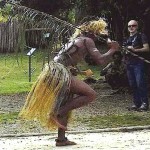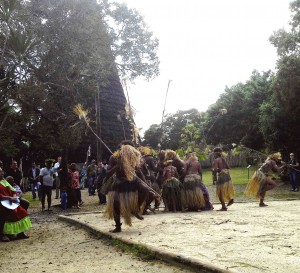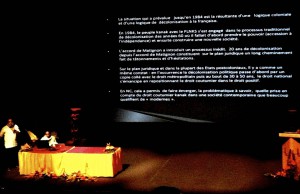 My PhD work focuses on the controversial case of the nickel exploitation in the South of New Caledonia: the Goro-Nickel project. This controversy involves the formulation of environmental (local, but also international) claims and the emergence of new identity-based groups, namely groups claiming to be autochthonous and supporting the local environmental cause. Part of my PhD thesis pertains specifically to the autochthonous Kanak identity and to its connections with this controversy. During the preparatory phase of my inquiry, I took interest in ethnological and anthropological research on New Caledonia, from the most classical- to the most contemporary literature on the subject. The reading of these texts reveals changes in the way the “Kanak world” is represented, going from an essentialist representation (Leenhardt, 1947) to more widely shared representations integrating the colonial history and its effects to that of the Kanak populations (Bensa, 1995). Finally, more recent research works in history and in anthropology seek to produce narratives that emphasize the co-construction of Kanak and colonial history (Trepied, 2010; Le Meur, 2010; Neapels, 2013).
My PhD work focuses on the controversial case of the nickel exploitation in the South of New Caledonia: the Goro-Nickel project. This controversy involves the formulation of environmental (local, but also international) claims and the emergence of new identity-based groups, namely groups claiming to be autochthonous and supporting the local environmental cause. Part of my PhD thesis pertains specifically to the autochthonous Kanak identity and to its connections with this controversy. During the preparatory phase of my inquiry, I took interest in ethnological and anthropological research on New Caledonia, from the most classical- to the most contemporary literature on the subject. The reading of these texts reveals changes in the way the “Kanak world” is represented, going from an essentialist representation (Leenhardt, 1947) to more widely shared representations integrating the colonial history and its effects to that of the Kanak populations (Bensa, 1995). Finally, more recent research works in history and in anthropology seek to produce narratives that emphasize the co-construction of Kanak and colonial history (Trepied, 2010; Le Meur, 2010; Neapels, 2013).
This article expresses a surprise stemming from my field experience related to these readings: the anthropological literature I had read was known and mobilized as a recurring explanatory resource by the actors I was interviewing. I soon noticed that, currently, they also largely come out with it in their practices. I have wished to make of this surprise an issue for reflection aiming at understanding the effects, the practices, and the transformations of anthropology produced by the actors, who admittedly were not the initial addressees of these works.
The omnipresence of Maurice Leenhardt
During my interviews with the actors involved in the ongoing Goro conflict — scientists, industrialists, regulators, members of environmental organizations, and of local / autochthonous populations — I was able to notice on numerous occasions that t hey mobilized notions related to progress, modernity, development (which often represented the mining world) and contrasted them with the notions of tradition, custom, and local knowledge in order to characterize the Kanak populations and their practices. During these interviews, numerous interviewees mobilized knowledge in anthropology stemming especially from the work of the anthropologist and missionary Maurice Leenhardt.
hey mobilized notions related to progress, modernity, development (which often represented the mining world) and contrasted them with the notions of tradition, custom, and local knowledge in order to characterize the Kanak populations and their practices. During these interviews, numerous interviewees mobilized knowledge in anthropology stemming especially from the work of the anthropologist and missionary Maurice Leenhardt.
Here are some examples of Leenhardt’s omnipresence on the field that I have noted in the course of my interviews and document analyses:
“The Kanaks have a form of shyness… It is sometimes difficult to understand each other, but all this is because for them – it’s what can be read in Pastor Leenhardt’s texts – everything is based on the collective… Thus as a result, the way we work requires efforts from them.” (Interview with the staff member of a New Caledonian mining industry in charge of local affairs, 2013).
“Personally I must say that I read Leenhardt, somewhat as I you would read a French history textbook, but also as something like a reunion… (laughter). Putting Leenhardt forward is for us a way of saying that there are other ways of thinking and that we, as a clan, do not think the same way as little metros like you.” (Interview with a member of the autochthonous party, 2013).
“The affinity the Kanak have with nature is very well documented, especially by the first anthropologists for whom it was the main research topic… And as ecologists we are necessarily seduced by this connection described by Leenhardt, and even if today this connection is in jeopardy we try to support it, because I think that there are links to be made with the environmental cause (…).” (Interview with a member of the environmental party Europe Écologie les Verts, who has been working in New Caledonia on the Goro-Nickel conflict, 2013).
Sometimes Leenhardt is even invited as a legal evidence. Here is an excerpt from a decision of the Appeal Court in Nouméa about a conflict between a group subjected to special local clan rules and a clan. This decision clarifies whether or not a clan can have a “legal personality” and if it can be a holder of land rights. In order to make the decision, the appeal court mobilizes Leenhardt in an attempt to identify what “the clan” means and what its rights are.
“Whereas the clan is the family reference unit; whereas the individuals have an identity only through the clan; whereas the clan is a holder of lands and is responsible for land distribution between its members; whereas Pastor Leenhardt emphasizes that, if the big Cheif has land at his disposal, it can only be the land of his own clan ([Maurice Leenhardt] Gens de la Grande Terre [1937, Gallimard, 9ème éd. 1953] p. 151).” (Excerpt from a court decision of the Appeal Court in Nouméa, August 22, 2011).
Leenhardt disputed
Inviting Leenhardt in the debates is however an object of discord. During my stay in New Caledonia in 2013, a conflict started between anthropologists working on New Caledonia and local Kanak political actors who proposed, via the Customary Senate, a project aiming at the establishment of a “common basis of Kanak values”. The objective of this initiative was to identify new avenues for further reflection on how to better adapt and represent the Kanak common law in New Caledonia from a legal point of view. Raphaël Mapou, a former indigenous leader who spearheaded the protests against the Goro-Nickel project, was the leader of the initiative. The anthropologists are retaining their reserve towards this initiative for various reasons; detailed explanations of these reasons can be found in the article by Christine Demmer and Christine Salomon, Droit coutumier et independence Kanak (2013): the critical anthropologists reproached the initiators of the project for representing the Kanak people as Maurice Leenhardt would have done it. Let us appreciate the extend of the issue: some contemporary anthropologists seem to disagree about the current definition of the Kanak identity used and promoted by a number of Kanak personalities, whereas this definition would proceed from a certain scientific knowledge in anthropology.
A much-needed reflection on the effects of the anthropological production
The perspectives opened by Leenhardt’s omnipresence we observed during the field survey, its contested appearance in contemporary New Caledonian political projects or its mobilization in decision-making, cover two different aspects of the anthropological production. On the one hand, about how social sciences are taken up and how the actors mobilize and appropriate concepts stemming from a discipline that for long was not meant for them and addressed a specialized audience. On the other hand, about the status of anthropology, the anthropologists and their commitments on these research fields.
The consequences of this discrepancy are numerous. I very quickly realized that Leenhardt’s work, as well as social sciences were not only bibliographical resources, they also proved to be an integral part of my research topic. It was no longer enough to study these texts as explanatory resources, I also had to consider them as field-work material that the actors are using.
At first I tried to detect the use of social sciences in the discursive practices of the actors and the role played by these practices. I thought that it was necessary to understand how and why Leenhardt’s works were mobilized: in a conference on nickel, in a scientific and technical symposium on environment, in an autochthonous discourse, or in my interviews with  them. This work requires to switch back and forth between Leenhardt’s books and the way they are used in the field. I was able to observe how frequently certain passages, often of a few lines, of Maurice Leenhardt’s studies are used.
them. This work requires to switch back and forth between Leenhardt’s books and the way they are used in the field. I was able to observe how frequently certain passages, often of a few lines, of Maurice Leenhardt’s studies are used.
Beyond the discursive practices, I concentrated on the use of social sciences and their setting in objects that sometimes have a strong instituating outreach: legal texts, for example, directives aiming at coordinating negotiations between the local populations and the industrial world about land issues and local employment, or projects to prepare the drafting of a customary law. Now that the Customary Senate of New Caledonia, with the support of Raphaël Mapou, the leader of the autochtonous movements in the Big South, suggests reflecting on the legal construction of a “common basis of Kanak values”, it is crucial to study how anthropology fits, if possible, into a definition of what it means to be Kanak.
When I started this work, I knew that this research field offered the opportunity to reflect upon the interrelation between environmental controversy and construction of identities; I expected less to be drawn in a reflexive approach about the implication of anthropology in these debates, but it is not the least charm of this PhD thesis!
Photo #1: First dance, International Day of the World’s Indigenous people, Centre Culturel Tjibaou, Nouméa, 9 August 2013. Photo: Julien Merlin.
Photo #2: Excerpt from a court decision of the Appeal Court in Nouméa, August 22, 2011. Source.
Photo #3: Raphaël Mapou, Project aiming at the establishment of a common basis of Kanak values, “Socle commun des valeurs kanak” (SCVK), Conference at the International Day of the World’s Indigenous people, Centre Culturel Tjibaou, Nouméa, 9 August 2013. Photo: Julien Merlin.
References
Bensa, A. (1995). Chroniques Kanak. L’ethnologie en marche. Paris, Survival International, coll. Documents : 18-19.
Demmer, C. & Salomon, C. (2013). Droit coutumier et indépendance kanak. Vacarme, 64 : 63-78.
Leenhardt, M. [1947] (1985). Do Kamo. La personne et le mythe dans le monde mélanésien. Paris, Gallimard,
Le Meur, P.-Y. (2010). Réflexions sur un oxymore : le débat du ‘cadastre coutumier’ en Nouvelle-Calédonie. In La Nouvelle-Calédonie, vers un destin commun ? Nouveaux enjeux, nouveaux terrains, E. Faugère & I. Merle (Eds.). Paris, Karthala, coll. KARAPAA. Mémoire et actualité du Pacifique: 101–26.
Neapels, M. (2013). Conjurer la guerre. Violence et pouvoir à Houaïlou (Nouvelle-Calédonie). Paris, Éditions de l’EHESS, En temps & lieux.
Trepied, B. (2009). Coutumiers kanak contre élus FLNKS : la bataille de l’eau à Koné (Nouvelle-Calédonie, 2004). In B. Bosa et E. Wittersheim (Eds.), Luttes autochtones, trajectoires post-coloniales. Paris, Karthala, coll. Les Terrains du Siècle: 27-56.


